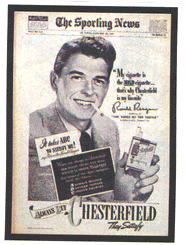
Another front in the noble Campaign to Eradicate All Evil Everywhere. Another crusade to protect liberty and to project virtue on the world, whether it wants it or not.
And, as usual, the locals are bitchin' and moanin'...
The wary residents of this sweltering town in Bolivia's remote Chapare jungle have a nickname for the uniformed newcomers: "America's mercenaries."
The Expeditionary Task Force, the official name for an armed unit of 1,500 former Bolivian soldiers, is paid, fed, clothed and trained by the U.S. Embassy in La Paz, the Bolivian capital. Since setting up camp 18 months ago on three bases around this town of 2,000 inhabitants, the troops and their assault rifles have become a common sight on the local highway, putting down protests along the steamy jungle road by peasants combating a sweeping, U.S.-backed campaign to eradicate the area's biggest cash crop -- coca.
The force, which has tripled in size since its inception, has become one of the most contentious signs of Washington's involvement in the drug war.
U.S. and Bolivian military officials say the unit has played a vital role in an aggressive attempt to eradicate coca from the Chapare jungle, a region larger than Connecticut that provided the basic ingredient for almost half the world's cocaine during the 1980s and 1990s. Although the soldiers are directly salaried by the U.S. government, American and Bolivian officials describe the outfit as "a group of reservists" within a regular Bolivian army brigade and commanded by regular Bolivian officers.
But a growing number of critics are calling the force an abusive irregular army whose existence violates Bolivian law. And the unit, described by Latin American scholars as the first of its kind in the drug war, has been accused of using excessive force and committing human rights abuses, including murder and torture.
Why can't those Bolivians understand that this is all in their interest?
On Dec. 6, a typically hot summer's day in the Chapare, one of the most severe of the alleged excesses involving the task force took place. At the coca growers union headquarters in Chimore, a group of protesters lined fruit along the side of the road. In a videotaped account of the event broadcast nationwide, it appeared to be a peaceful demonstration highlighting one of the biggest criticisms of alternative development here: low prices and lack of access to domestic and international markets for legal crops such as bananas and pineapples.
Soon after the protest started, task force soldiers arrived and began seizing fruit from demonstrators. Soldiers are seen on the videotape kicking and punching farmers as they order them back into the marketplace. The forces can also be seen roughing up the mayor, Epifanio Cruz, as he tried to calm the situation. Soon, the security forces began launching tear gas.
After one soldier was apparently hit in the face by a rock, retaliation was swift. The contract soldiers chased coca farmers into the union compound. Four shots went off. When the soldiers emerged, the local union leader, Casimiro Huanca, 55, was fatally wounded. A second victim, farmer Fructuoso Herbas, 34, had to have his right leg amputated below the knee after he was shot once in the leg.
::Anthony Faiola, Washington Post: U.S. Role in Coca War Draws Fire
also...
::Chris Floyd, Moscow Times: Global Eye -- Jungle Fever
::CorpWatch, Bulletin - January 30: Coca Grower Killed in Bolivia










